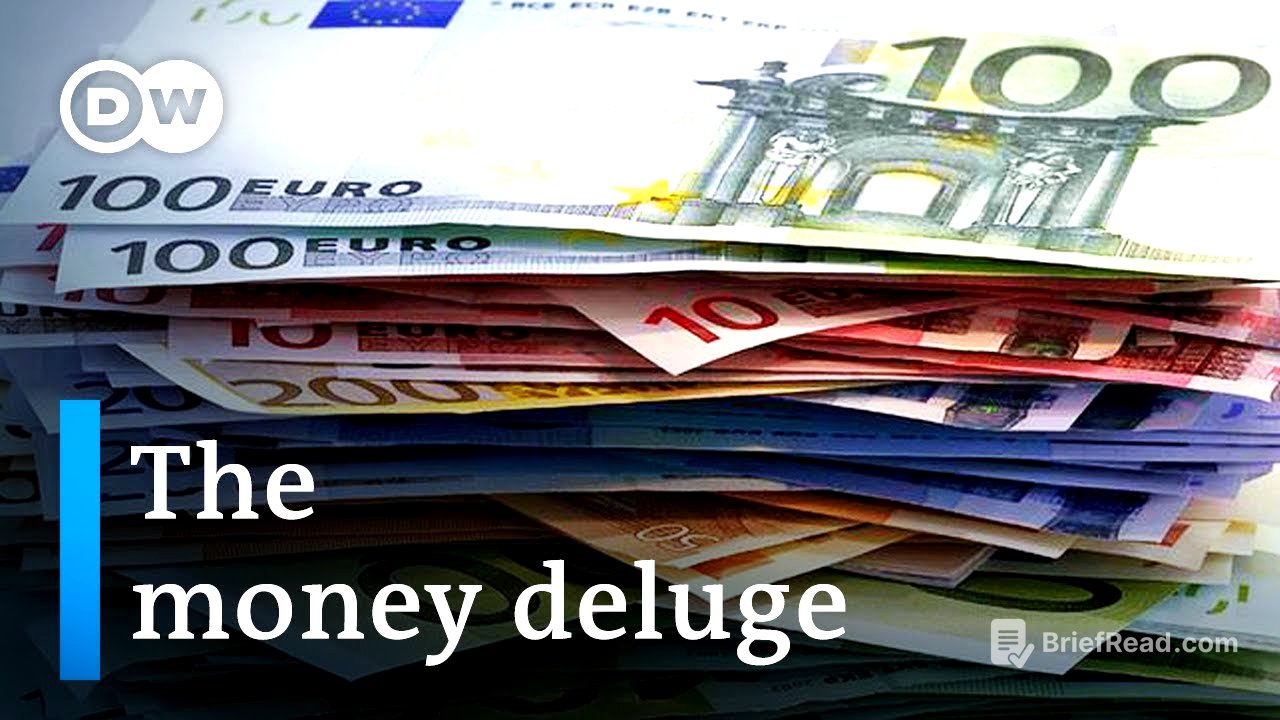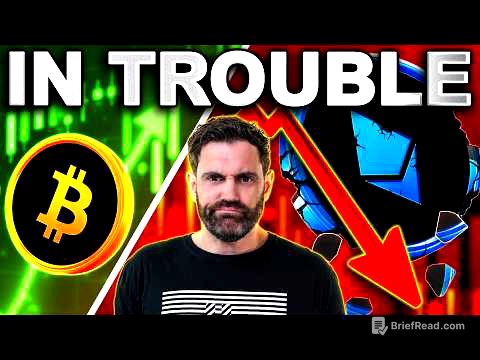TLDR;
This documentary explores the unprecedented amount of money in the world, the cheapness of borrowing, and the continuous pumping of money by central banks. It examines the consequences of this "money deluge," including the enrichment of the wealthy, the struggles of savers, and the instability of the global financial system. The documentary also investigates the creation of money by private banks and potential solutions to address the issues caused by the current financial system, such as limiting the power of private banks and implementing a global financial transaction tax.
- Unprecedented amount of money and cheap borrowing rates.
- Consequences include wealth concentration, struggles for savers, and financial system instability.
- Private banks create most new money through deposit money creation.
- Potential solutions: limiting private bank power, global financial transaction tax, and debt reduction.
Introduction: The Money Deluge [0:02]
The world is currently experiencing an unprecedented flood of money, with central banks continuously injecting trillions of dollars and euros into the global economy. This has made borrowing exceptionally cheap, allowing organizations to accumulate large debts at minimal cost. This system enables the wealthy to grow even richer, while savers lose billions due to low interest rates. This overabundance of money fuels massive deals, where companies are bought and sold for enormous sums, turning employees into pawns of speculators.
The Dilemma of Savers in Germany [1:45]
In Germany, many people face the challenge of what to do with their savings in a world of near-zero interest rates. Carl Heinz Ice, a retired court bailiff, is concerned about investing his life insurance payout in a way that provides security in old age. Traditional savings accounts offer almost no return, with interest rates as low as 0.01%, leading some people to withdraw their money and store it as cash or gold.
The European Central Bank's Role [4:30]
The European Central Bank (ECB) is responsible for maintaining price stability by using the base rate as a tool. The ECB has steadily lowered base rates to zero since the financial crisis, which has hurt savers but benefited countries with high debt, such as Greece, and struggling banks in southern Europe. The ECB's policy of buying government bonds aims to stimulate growth, but it has also led to a surge of money that inflates the prices of shares and real estate, further concentrating wealth.
The Dangers of Too Much Money [6:38]
Economist Max Otter warns that the flood of cheap money is a symptom of a deep sickness in the global financial system. This influx of money endangers the economy and promotes increasing debt levels. The biggest risk is that it widens the gap between the rich and poor, acting as a redistribution machine that moves money from the bottom upwards.
London: A Case Study of Monetary Deluge [8:45]
London, the world's largest financial center, exemplifies the effects of the monetary deluge. Trillions of euros are traded here, driving real estate prices to extreme levels. Roman Borisovich is fighting against the sell-off of London to speculators, noting that many expensive houses are speculative objects owned by investors who don't live in the city. There are over 40,000 properties in London owned by anonymous offshore corporations, raising concerns about the origin of the money.
The Impact on Ordinary Residents [12:51]
Alf Townsend, a taxi driver in London for 54 years, has witnessed the financial excesses firsthand. While the financial sector has benefited London, ordinary locals can no longer afford to live in the city center. Garant Anderson, a former financial star, left London for a farm in Wales, disillusioned with the greed and lack of regulation in the financial system.
The Ponzi System and the Need for Regulation [15:09]
Garant Anderson describes the financial system as a Ponzi scheme, where organizations borrow large sums of money from each other, creating a system where no one truly has the money to back up the lending. A financial transactions tax could slow this process, but efforts to implement such a tax have failed due to opposition from countries like Britain. The ECB's policy of flooding the world with cheap money is merely a temporary fix with serious long-term side effects.
The Plight of Savers and the Advice of Financial Advisors [17:54]
Low interest rates are hurting savers like Carl Heinz Ice, who remembers a time when savings accounts offered reliable returns. His financial advisor recommends investing in stocks and bonds to generate a return, despite Carl Heinz's discomfort with higher-risk investments.
Corporate Acquisitions and Their Impact [20:14]
The low interest rate environment has fueled a wave of corporate acquisitions, such as Bayer's purchase of Monsanto and Anheuser-Busch InBev's acquisition of SAB Miller. These deals often benefit shareholders but can have negative consequences for employees. The case of WMF, a German manufacturer that has changed owners multiple times, illustrates how financial investors can profit from buying and selling companies while wages and working conditions worsen.
The Deregulation of the Financial World [25:20]
The deregulation of the financial world began in 1971 when President Nixon ended the gold standard to finance the Vietnam War. This led to a surge of money and the development of new investment models focused on making money with money. Deregulation continued in the 1980s and 1990s, opening the global casino for business. This liberalization allowed banks to act internationally and engage in more speculation, with less connection to the real economy.
The Creation of Money by Private Banks [27:55]
Most people are unaware that private banks, not central banks, create most of the new money through a process called deposit money creation. When someone takes out a loan, the bank creates the money from nothing, only needing to deposit a small percentage with the central bank. This gives private banks a license to make money and collect interest, a privilege that used to belong to governments.
The Swiss Initiative for Fully Backed Money [32:20]
In Switzerland, an initiative is advocating for fully backed money, where only the National Bank would be allowed to create money. This would end the privilege of private banks to generate electronic money at the push of a button. The initiative aims to take away the right of banks to create money, but they would still be allowed to lend money, manage assets, and oversee financial transactions.
The Need for Money to Benefit Society [36:12]
While the world is flooded with cheap money, many innovative startups struggle to access funding. Laurin Hahn, who is developing an eco-friendly electric car called Zion, has been unable to secure a bank loan and has had to rely on private donors. There is a need for money to go to places where it benefits society and supports sustainable products and services.
Conclusion: The Path Forward [39:09]
Carl Heinz Ice invests in renovations to his house, recognizing the importance of paying attention to money matters. The documentary concludes that the current financial system is likely to lead to the next disaster and calls for a return to highly regulated financial markets and a banking sector under control. States need to reduce their debts, and there needs to be a global tax on financial transactions. Money needs to go to places where it benefits society, and the interests of the financial industry should no longer dominate politics and society.









